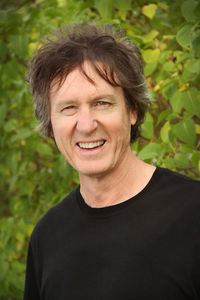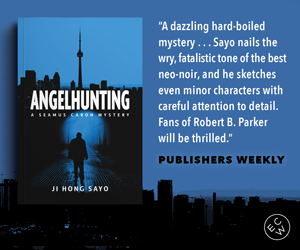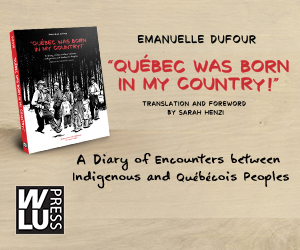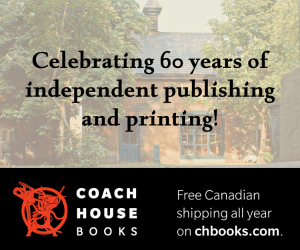David Ward, Back from 5 Years in a Tiny, Isolated Newfoundland Community, Shares Publishing Highs & Lows
For writers in Canada, Newfoundland is a special place. After five years living in an isolated Newfoundland community, ecologist David Ward understood that intimately. His story of that time, Bay of Hope: Five Years in Newfoundland (ECW Press), is quintessential Newfoundland: witty, nature-focused storytelling with huge amounts of heart.
The hybrid book incorporates memoir and accessible nature writing as Ward shares how he ended up in parts of Newfoundland most Canadians never experience, how he worked and survived there, and how the loneliness of isolated life impacted him even as he came to bond with his neighbours - just 78 in the whole community.
With echoes of Farley Mowat and Michael Crummey, Bay of Hope shows us an intimate portrait of a unique place and the unique man who captured it.
We're excited to welcome David to Open Book to tell us about his publishing journey in our Going Pros and Cons interview. He tells us about an enviable one-hour response time for his first book submission, shares a heartwarming story from a recent reading event that got us a little choked up, and names the most valuable thing in the world to him as a writer.
Going Pros & Cons with David Ward
My first big writing/publishing victory and how I celebrated:
I was working on the final chapter of my first book when I thought I would test the waters to see if there were any publishers who might be interested in it. I’d seen all their warnings about how I shouldn’t expect to hear from them for at least three months after submitting. Plus I’d heard all the horror stories about writers receiving rejection slip after rejection slip into eternity. So I submitted two short chapters to my dream publisher — ECW — and went back to my desk thinking that I had at least three months to finish that final bit. An hour later I get a message telling me they want to see it all, which was wonderful. But it wasn’t done yet! I thought I had three months to complete it! That was on a Thursday, so I spent the weekend pulling it together the best I could and sent it to them on Monday. I hope other writers don't hate me for this, but, my biggest publishing victory is that I’ve never received a rejection slip, and I’ve been celebrating ever since.
My best public reading or event experience:
A person who I believe was experiencing homelessness showed up at one of my readings. He was holding a copy of my book, Bay of Hope, and he was working it over like it was an accordion — he was anxious. First thing he did was apologize for being there. He kept saying he wasn’t “going to cause any trouble,” and he hoped he wasn’t “out of place.” I assured him he was welcome. Then, just making small talk, I asked where he got a copy of my book from. He said, “I saw your brother hanging posters [promoting your reading] and I asked him if they had any of your books at the library. Next thing I know, [your brother] walks into this store and buys one for me.”
I could have cried when I heard that. Then when the Q&A period arrived I could tell, from his thoughtful contributions to the discussion, that this man had read my entire book, and that made me happy for us all.
My favourite part of the publishing process:
After years of sitting alone with my own thoughts, and I mean alone, suddenly I’m surrounded by people with different areas of expertise than I have, and tons of knowledge and assistance to offer. And lots of enthusiasm. All kinds of editors, marketing professionals, shipping and packaging people, publicists, number crunchers, cover artists, book designers... So if you can just trust these people — let go of control for a little while — it’s amazing what they can create, and what you can learn from them. And I love learning.
My least favourite part of the publishing process:
My least favourite part of the publishing process is the period between when the publisher buys my book, and when we start working on it, together, to turn it into the product that will ultimately sit on store shelves. For some reason — I really haven’t figured out exactly why — I suffer a considerable crash in self confidence in those weeks and months after the publisher initially purchases it. And my swagger doesn’t return until the publishing machine gets intensively involved again. That brief depression I experience might have something to do with how... Actually, I don’t have a clue why this happens, but, trust me, it’s real, and it’s painful for me.
What I think about literary awards:
Okay, a bit of background here because my answer to this question is currently in flux:
Your CanLit News
Subscribe to Open Book’s newsletter to get local book events, literary content, writing tips, and more in your inbox
I’ve been fortunate to win a couple of literary awards, and doing so was significant for me in my growth as a writer. Because, winning validated what I was trying to do. But I’ve written two books now and gained considerable confidence throughout the process. So I’m not sure I need that external validation the way I once did. I think it’s time that I decide for myself whether my work is worthy, and not listen so much to the critics and the awards agencies. But it’s taken me nearly ten years — heck, it’s taken me a lifetime — to arrive at this place.
Yet, having said that, I still think that receiving a literary award can be wonderful. It’s just that, should I be fortunate enough to receive another one, some day, my job will be to recognize that the people providing the award simply decided that my work was deserving, and leave it at that. I don’t want to use such a wonderful occurrence to mostly build up my ego anymore.
In summary, I value literary awards. I just want to make sure I feel this way for the right reasons.
The thing(s) I need at/during/before an event or reading:
Nothing. I’ve done readings at Toronto’s Harbourfront Centre, and in front of a small gathering in an isolated outport, and every environment in between. It doesn’t matter to me if one person shows up, or if we fill a university lecture hall; whether it’s a paid event or not — even if the lights go out — I don’t care. I’m thrilled that someone asked, and I’ll give them the best that I have to give. I don’t need anything from anybody, thanks. I’m just grateful for the interest and the invite.
The thing(s) I need at/in my writing space:
Large blocks of uninterrupted time. I’m sure there are people who can write on the subway, or after the kids go to bed... but I’m not one of them. The physical, emotional, and economic matters that I need to attend to before I can get myself to sit down at my desk and write, are considerable. I had to quit a full-time faculty position at a Canadian college to open up room for me to write. Then I had to crawl out from under an Ontario mortgage and then find myself a tiny little space with few distractions where I could throw myself at the task of authoring. Yes, indeed — my writing space needs to set me up for success, and the best way for that to occur is for me to find a way to spend a lot of time at my desk. So, make no mistake about it — for me to write, I need to manufacture large blocks of uninterrupted time. Nothing — nothing — is of more value to me than that.
_______________________________
While he has had many different jobs, and lived in a large number of places, David Ward currently considers himself a writer/teacher who resides on the Trent-Severn Waterway in Fenelon Falls, Ontario. Author of the award-winning and critically acclaimed The Lost 10 Point Night, David is a former recipient of the Charles E. Pascal Award for Excellence in Teaching.




